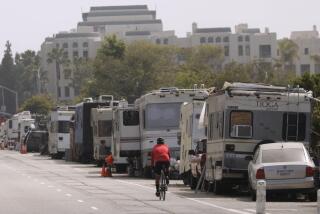The Empty Trailers
- Share via
The homeless are getting plenty of attention at Los Angeles City Hall. Mayor Tom Bradley has developed new rules for how and when police, street-maintenance workers and sanitation workers can sweep the makeshift camps--with plenty of advance warning and without destroying personal belongings. The City Council, led by Zev Yaroslavsky, has called for an investigation into a controversial police sweep of two encampments. Both steps may help homeless men and women hang onto blankets, identification, medicine and other possessions, but neither reaction will provide a single new bed, a single storage locker, a single toilet or a single shower for people who live on the streets.
If the mayor and the council don’t want people sleeping on sidewalks or congregating in camps made out of cardboard and bedrolls, they must bring more homeless people inside. If the mayor and the council are worried--and legitimately so--about sanitation, health and public safety, they must bring more homeless people in off the streets even though the providing of shelter is legally a county responsibility--an obligation that has been given low priority for years.
The council can start with the trailers. At the mayor’s request, the city’s Community Redevelopment Agency bought 102 used trailers to provide temporary shelter for homeless families, primarily single mothers and their children. The two- and three-bedroom trailers arrived furnished nearly a year ago. Only 24 have been placed. The others remain empty and in storage at city expense because the majority of the council--except for Richard Alatorre, Joan Milke Flores and Ernani Bernardi--have not made room in their districts for a single homeless family.
The council and the mayor have a moral obligation to help the homeless people. City officials claim that they spent nearly $1 million in providing services last year. That is admirable, but what about those empty trailers? Bradley and the Los Angeles City Council have got to do more than merely guarantee that homeless men and women won’t lose their possessions from makeshift camps in the shadow of City Hall.
More to Read
Sign up for Essential California
The most important California stories and recommendations in your inbox every morning.
You may occasionally receive promotional content from the Los Angeles Times.






